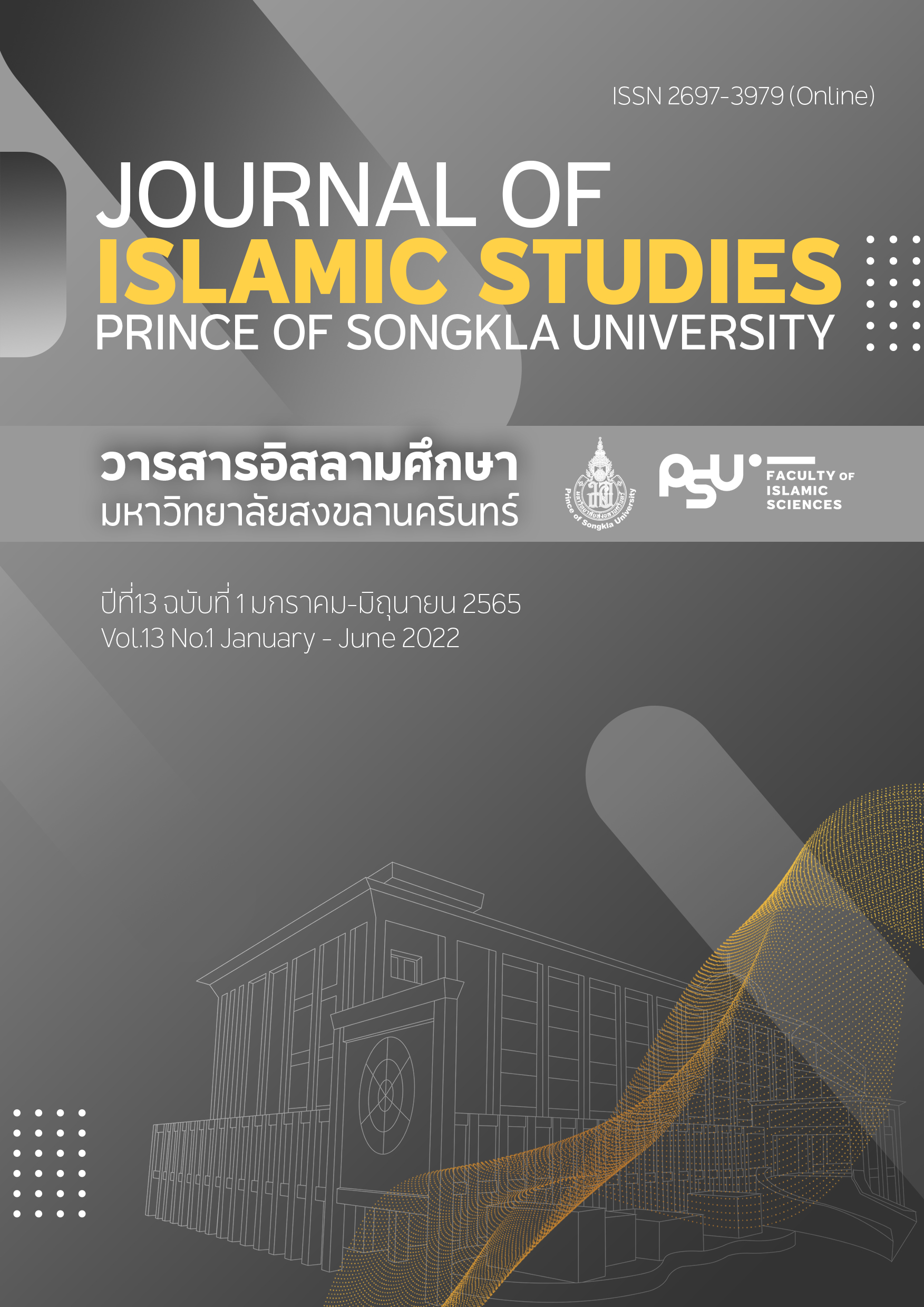พหุวัฒนธรรมของรัฐและพหุวัฒนธรรมของชาวมลายูมุสลิม: กรณีศึกษาบทสนทนาเกี่ยวกับแนวคิดเรื่องพหุวัฒนธรรมในสามจังหวัดชายแดนภาคใต้
คำสำคัญ:
พหุวัฒนธรรม, ผู้รู้ศาสนา, อูลามาอ์, มลายูมุสลิมปาตานี, นโยบายความมั่นคงบทคัดย่อ
วัตถุประสงค์ เพื่อศึกษา 2 ประเด็นหลักดังนี้ 1) ศึกษาแนวความคิดพหุวัฒนธรรม (multiculturalism) ที่รัฐนำมาใช้เป็นนโยบายเพื่อแก้ปัญหาความไม่สงบในสามจังหวัดชายแดนภาคใต้โดยศึกษาความเข้าใจของรัฐต่อมโนทัศน์ (concept) พหุวัฒนธรรมซึ่งสะท้อนผ่านเอกสารนโยบายด้านความมั่นคง และความเข้าใจของเจ้าหน้าที่รัฐในฐานะผู้นำนโยบายมาปฏิบัติ 2) ศึกษาการอธิบายแนวความคิดพหุนิยมของชาวมลายูมุสลิมปาตานีผ่านผู้รู้ศาสนา ผู้นำภาคประชาสังคม และข้อถกเถียงต่อนโยบายดังกล่าว
วิธีการศึกษา เป็นการศึกษาเชิงคุณภาพโดยมีกลุ่มผู้ให้ข้อมูลหลัก (key informants) เป็นผู้รู้ศาสนาในจังหวัดปัตตานี ยะลา และนราธิวาส ความเข้าใจของคนกลุ่มนี้ที่มีต่อแนวคิดพหุวัฒนธรรม การอยู่ร่วมกันระหว่างศาสนา ถ่ายทอดสู่ประชาชนผ่านการบรรยายทางศาสนา งานเขียน การเทศนาประจำมัสยิด (คุตบะฮ์) ตลอดจนการเรียนการสอนศาสนาในช่องทางอื่น ๆ ภายในชุมชน นอกจากนั้นยังได้เก็บข้อมูลจากเจ้าหน้าที่ผู้นำนโยบายการบริหารและการพัฒนาจังหวัดชายแดนภาคใต้ไปปฏิบัติโดยเฉพาะอย่างยิ่งจากเจ้าหน้าที่ระดับกลางของ ศอ.บต. และหน่วยงานความมั่นคงในพื้นที่
ผลการศึกษา พบว่ารัฐมีชุดความเข้าใจต่อมโนทัศน์พหุวัฒนธรรมในฐานะที่เป็นเครื่องมือที่ก่อให้เกิดความเป็นอันหนึ่งอันเดียวกัน โดยเจ้าหน้าที่ผู้นำนโยบายไปปฏิบัติมุ่งเน้นจัดกิจกรรมให้กลุ่มทางศาสนาคือพุทธและมุสลิมอยู่ร่วมกัน โดยไม่พูดถึงปัญหาเชิงโครงสร้างที่ก่อให้เกิดความขัดแย้ง โดยเฉพาะปัญหาโครงสร้างทางอำนาจ ประเด็นดังกล่าวเป็นข้อถกเถียงหลักของผู้นำภาคประชาสังคมซึ่งพวกเขาพยายามชี้ให้เห็นว่าความเป็นพหุวัฒนธรรมนนั้นหัวใจหลักอยู่ที่การจัดสรร และกระจายอำนาจอย่างเท่าเทียมและเป็นธรรม ขณะที่ผู้รู้ทางศาสนามีหลากหลายแนวคิดที่ตอบสนองต่อชุดคำอธิบายของรัฐและเจ้าหน้าที่รัฐ อย่างไรก็ตามผู้รู้ศาสนามีจุดร่วมเดียวกันโดยยืนยันว่า พหุวัฒนธรรมคือการเคารพในศาสนา และวิถีปฏิบัติทางศาสนาของกันและกันไม่ใช่การต้องมาทำกิจกรรมร่วมกันระหว่างศาสนา
การนำผลวิจัยไปใช้ สามารถนำข้อค้นพบเรื่องความเห็นที่แตกต่างกันของภาคส่วนต่าง ๆ ในเรื่องความเข้าใจเรื่องพหุวัฒนธรรม ไปปรับแก้และสร้างความเข้าใจร่วมกัน โดยการเติมเต็มซึ่งกันและกันของภาครัฐ ภาคประชาชน ผู้นำศาสนา และองค์กรภาคประชาสังคม
เอกสารอ้างอิง
Azra, A. (2004). The Origins of Islamic Reformism in Southeast Asia: Networks of Malay-Indonesian and Middle Eastern Ulama in the seventeenth and eighteenth centuries. University of Hawai’I Press.
Che Man, W. K. (1983). Muslim Elites and Politics in Southern Thailand. MA. Universiti Sains Malaysia.
Duncan, M. (2008). Tearing Apart the Land: Islam and Legitimacy in Southern Thailand. Cornell University Press.
Ibrahim, A. (2014). Contemporary Islamic Discourse in the Malay-Indonesian World: Critical Perspectives. Strategic Information and Research Development Center.
James, W. (2008). A Pluralistic Universe, Ed. H.G. Callaway. Cambridge Scholars Publishing.
Kymlicka, W. (2007). Multicultural Odysseys: Navigating the New International Politics of Diversity. Oxford University Press.
Matheson, V., & Hooker, M.B. (1998). Jawi Literature in Patani: The Maintenance of an Islamic Tradition. JMBRAS. (61). 2-24.
Parnikkar, R. (1995). Philosophical Pluralism and the Plurality of Religions. Religious Pluralism and Truth. State University of New York Press.
Troll, C. W. (1999). The Claims of religious truth and socio-political pluralism. One World for All: Foundation of a Socio-Political and Cultural Pluralism from Christian and Muslim Perspectives. Vikas.
Yahprung, A. (2014). Islamic Reform and Revivalism in Southern Thailand: A Critical Study of the Salafi Reform Movement of Shaykh Dr. Ismail Lutfi Chapakia Al-Fatani, 1986–2010. International Islamic University.
Srigate, G. (2018). Political analysis according to the concept of multiculturalism. Sukhothai Thammathirat Open University.
Editorial department (2017). Reflections on Multicultural Concepts and Strategies for Resolving Unrest in the Southern Border Provinces. Patani Forum, 3(22), 8.
Satha-Anand, C. (2007). Social Integration and State Security Issues: Remarks on the Case of the Four Southern Provinces, Thailand. The Origin of Southern Fire. Chulalongkorn University Press.
Uppama, T., & Suetair, A. (2021). Ummah Wasat – The Middle Nation: The concept of human civilization emplacement in Islam. Journal of Islamic Studies, Prince of Songkla University, 12(2), 16–28. Retrieved from https://so03.tci-thaijo.org/index.php /JOIS/article/view/254732
Wasi, P. (2005). Policy implementation process to solve problems in the southern border provinces sustainably. Research report to submit to the Office of the National Research Council of Thailand.
Sirisakdamkoeng, P. (2003). Interaction between Malay Muslims and Chinese in the Central District, Yala Province. Faculty of Archaeology, Silpakorn University.
Salaeh, R. (2001). Interactions between religions appearing in Pattani, Yala and Narathiwat Provinces. Research Fund Office.
Sunanta, S. (2556). Learning from the west? The state of the multicultural debate in Thailand. Journal of Language and Culture, 32(1), 4-22.
Sattayanurat, S. (2002). Thai Nationality and Thainess by Luang Wichitwathakan. Matichon Publishing House.
Sattayanurat, S. (2014). 10 Siamese intellectuals: intellectuals after the 1932 revolution (eds 2). Openbooks.
Office of the National Security Council. (2017). Administrative Policy and Development of Southern Border Provinces 2017 – 2019. Cabinet Publishing and Government Gazette.
Saengchai, A (2018). Multiculturalism and the Controversy about Gender and Religious Ways. In Ekarin Tuansiri (Editor), Multicultural Perspectives. (p. 106-123). Patani Forum.
Kanchanaphan, A (2018). Multiculturalism in the context of transition. In Ekarin Tuansiri (Editor), Multicultural Perspectives. (p. 2-35). Bangkok: Patani Forum.
Japaqiya, I. (2011) Islam Religion of Peace. Asslam Institute.
Tuansiri, E. (2018). Multicultural Policy in Southern Border Provinces. In Ekarin Tuansiri (Editor), Multicultural Perspectives. (p. 82-105). Patani Forum.
ดาวน์โหลด
เผยแพร่แล้ว
รูปแบบการอ้างอิง
ฉบับ
ประเภทบทความ
สัญญาอนุญาต
ลิขสิทธิ์ (c) 2022 วารสารอิสลามศึกษา มหาวิทยาลัยสงขลานครินทร์

อนุญาตภายใต้เงื่อนไข Creative Commons Attribution-NonCommercial-NoDerivatives 4.0 International License.
บทความทุกเรื่อง ที่ได้รับการตีพิมพ์ในวารสารอิสลามศึกษาเป็นแนวคิดของผู้เขียน มิใช่เป็นความคิดเห็นคณะผู้จัดทำและมิใช่ความรับผิดชอบของคณะวิทยาการอิสลาม กองบรรณาธิการไม่สงวนสิทธิ์การคัดลอก แต่ให้มีการอ้างอิงแสดงที่มา




